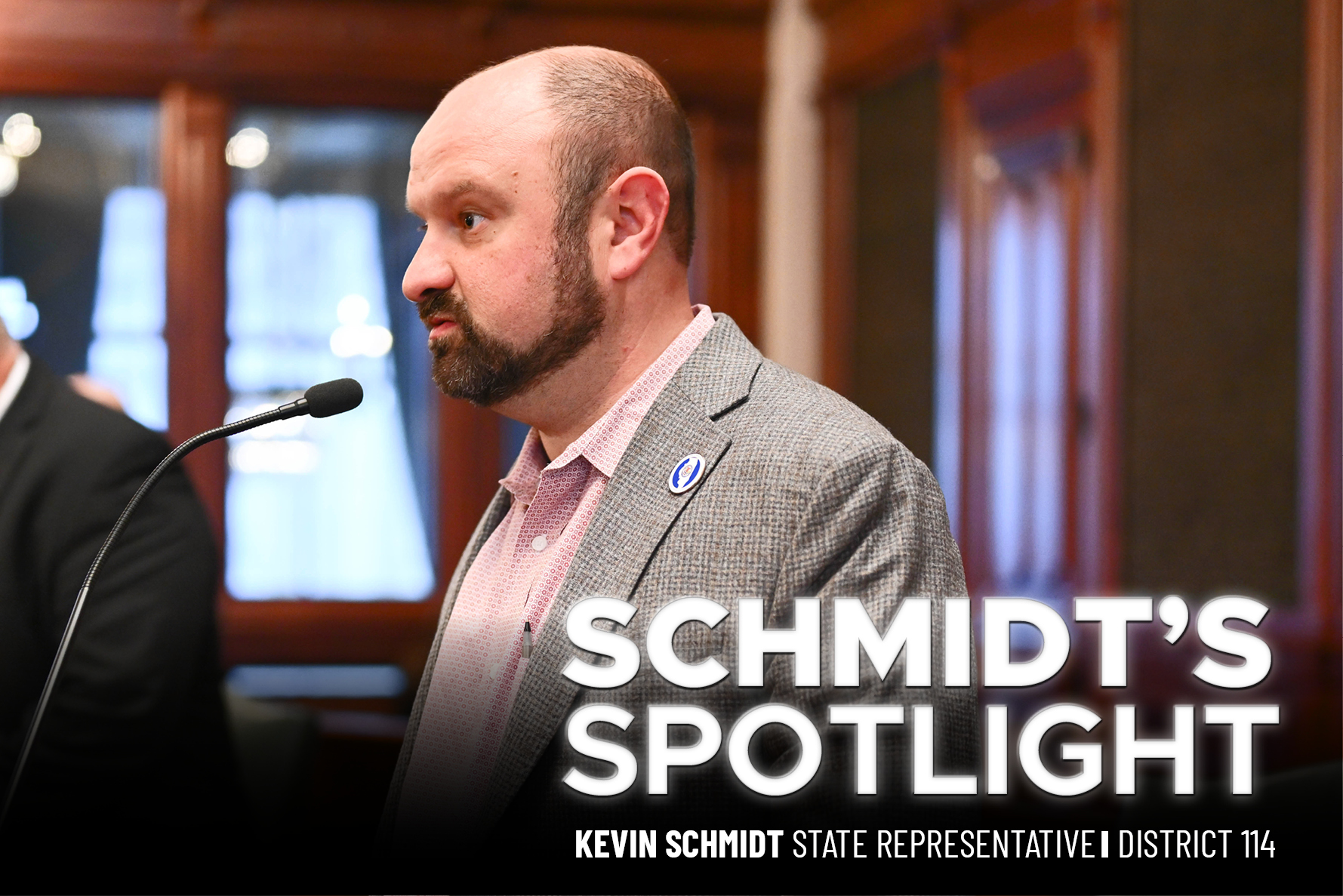Dear Neighbor,
While this week was scheduled to be the last week of our spring legislative session in Springfield, it didn’t turn out that way. Instead, we will be returning next week on Wednesday, Thursday, and Friday. Why? Because the majority party couldn’t produce a budget by their own self-imposed deadline.
As we go into the last few days of legislative session, I promise to fight hard to represent you to the best of my abilities. You can follow along live at https://ilga.gov/houseaudvid.asp on Wednesday, Thursday, and Friday.
As usual, thank you for making our communities what they are. I am honored to serve as your State Representative.
Sincerely,
State Representative Kevin Schmidt
District 114
Summer Reading Program
My Summer Reading Program challenges kids to read 8 books during their summer break. Books of 150 pages or more count as two books.
Once a student completes the reading, fill out the form below, have a parent or guardian verify that the books were read, and then return the form to Rep. Schmidt’s office or any of the local libraries listed on the form below.
Children who have read 8 or more books and returned this form will have a chance to win one of the following prizes: A dodgeball, basketball, soccer ball, or volleyball. All participants will also receive 2 free tickets to a Gateway Grizzlies Baseball game on either August 8th or 9th. (Additional tickets available to purchase for $10 each).
Completed forms are due by August 1st. Contact Monica at 618-215-1050 for more information.
VIDEO: I Respond to Dems Failure to Produce a State Budget
I spoke on the Democrats failure to produce a budget on the last scheduled day of the spring legislative session. Full video below:
Rep. Schmidt Responds to Dems Failure to Produce a State Budget – YouTube
VIDEO: Multiple Fires in Washington Park: Rep. Schmidt Appears on KMOV 4
I appeared on KMOV 4 news to discuss multiple fires in Washington Park and the desperate need for funding to rebuild their destroyed Fire Department building. Full video below:
Fire leaves family without home in Washington Park – YouTube
BUDGET
Governor’s Office revises FY23 revenue numbers sharply downward. The revision came in the monthly report that is required by law to be presented by the Governor’s Office of Management and Budget (GOMB) to the Legislative Budget Oversight Commission. By statute, the Oversight Commission oversees compliance by the executive branch with the budgets enacted by the General Assembly. In April 2022, the legislative branch enacted a budget for FY23 (the 12-month period starting on July 1, 2022, and ending on June 30, 2023) that was believed at the time to be in surplus.
The General Assembly’s budget-monitoring arm, the Commission on Government Forecasting and Accountability (CGFA), has already warned that Illinois’ FY23 tax revenues are falling far short of projections. Tax payments made to the Department of Revenue (IDOR) in the key tax payment month of April 2023 generated disappointing numbers. Now, GOMB has updated its April 2023 and FY23 numbers to reflect these tax shortfalls. The gap is a massive one. For example, GOMB had expected that, for April 2023, the State would receive individual income tax payments of $3.77 billion. In reality, the State received only $3.13 billion from this source in April 2023, leading to a shortfall of $637 million for the month. Corporate income tax payments and sales tax payments also fell short of expectations in April.
The GOMB report confirms that sharp, bipartisan action will be necessary if the General Assembly is to maintain its constitutional responsibilities and enact a balanced budget for the approaching FY24. With many facets of the global economy slowing down, money is coming in well below projections, and this is not a problem that going to go away. At the same time, many Democrats in Springfield are pushing for new spending programs and more generous funding for existing programs. The balanced annual Illinois State Budget is a Constitutional requirement set forth in Section 2 of Article VIII of the Illinois Constitution.
As Republicans push back against ballooning costs associated with free health care for undocumented immigrants, Democrats shut Republicans out of budget talks. The Medicaid-style health benefits program for undocumented immigrants now costs $1.1 billion, which is $880 million more than had been previously projected by the Illinois Department of Healthcare and Family Services (DHFS).
Within the terms of this controversial program, Illinois has repeatedly expanded taxpayer-funded health benefits for undocumented immigrant adults. The current program covers all adults in these categories who are aged 42 and up. These adults are covered in age groups aged 42 to 54, aged 55 to 64, and those aged 65 and up. Immigrant enrollees pay no insurance premiums or co-pays for this taxpayer-funded health benefits program.
Budget analysts say that the cost of this program, which has seen massive expansions in the Democrats’ budgets as recently as April 2022, is now swallowing up almost all of the natural growth in resources enjoyed by the State sector of Illinois’ overall public sector. Because this program is growing so fast, there is no additional money to deal with other urgent priorities.
The Rules of the House and Senate chambers of the Illinois General Assembly provide for appropriations committees to meet, hear witnesses, discuss the budget issues facing Illinois, and allocate available money. In a series of moves associated with Illinois’ current budget shortfall, and with the sharp cost pressures associated with undocumented immigrants and other needs, the hard numbers in the FY24 budget have been pulled out of the appropriations committees and moved behind the Democrats’ closed doors.
COVID-19
Official end to COVID-19 emergency in Illinois. After 1,155 days of continuous rollovers, Governor JB Pritzker allowed the coronavirus emergency proclamations in effect throughout Illinois to expire. The expiration marks the end of more than three years of mandatory stay-at-home orders, partial economic shutdowns, and mandatory facial coverings and vaccinations in a variety of workplaces and settings. These government-ordered precautionary measures changed the daily lives of millions throughout Illinois. The COVID-19 emergency was first declared by disaster proclamation on March 9, 2020, as infectious coronavirus spread into the United States from mainland China.
Illinois was one of the last states to declare an official end to the coronavirus pandemic. By May 2023, 44 of the 50 states had already ended their pandemic states of emergency. The final COVID-19 emergency proclamation orders expired in Illinois on Thursday, May 11.


